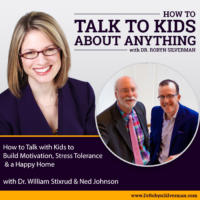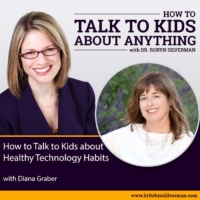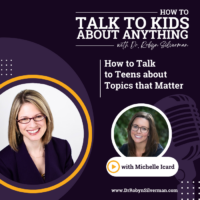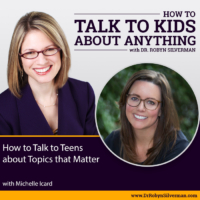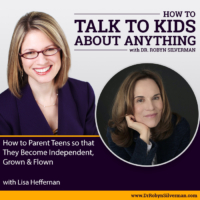Podcast: Play in new window | Download
Subscribe: Apple Podcasts | RSS | More
How to Build Resilience in Teens
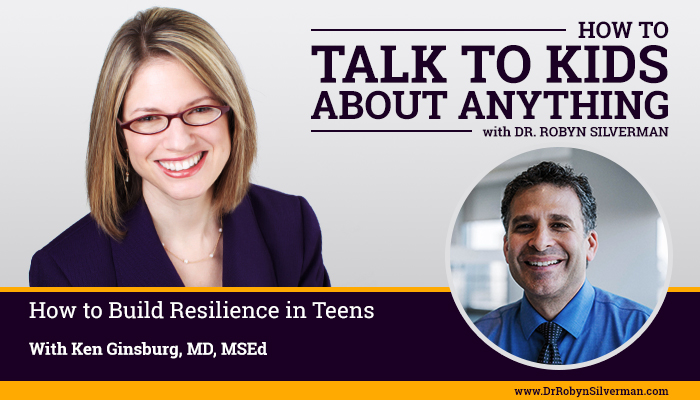
This podcast helps parents and educators discover how to build resilience in teens. As young people are working to gain more independence, they make more mistakes and must learn how to recover. Sometime they need to learn how to get back up after a big fall while other times they must learn how to move forward after small, everyday blunders. How can we help kids learn how to believe in themselves, their own skills, their own sense of control and adaptability while also knowing we are here when they really need us? We talk about the 7 Cs of resilience with Dr. Ken Ginsberg and receive some beautiful tips and scripts that help us know the dos and don’ts while raising teens who thrive no matter what twists and turns they encounter.
Special Guest: Dr. Ken Ginsburg
One of our goals, as parents, educators and coaches who work with children is to help kids to become resilient—to  face challenges and use their strengths to keep going in both good and bad times. When children learn to cope with failure, to get back up when they fall, to change direction when they realize their mistakes, to take healthy risks, apologize and ultimately do hard things- they become confident in themselves, their abilities, and their self-worth. How do we build resilience in children? There are specific areas that we can help children bolster and exercise so that they can thrive, even against all odds, and do great things in life. How do we get started? For that, we are going to turn to Dr. Ken Ginsberg.
face challenges and use their strengths to keep going in both good and bad times. When children learn to cope with failure, to get back up when they fall, to change direction when they realize their mistakes, to take healthy risks, apologize and ultimately do hard things- they become confident in themselves, their abilities, and their self-worth. How do we build resilience in children? There are specific areas that we can help children bolster and exercise so that they can thrive, even against all odds, and do great things in life. How do we get started? For that, we are going to turn to Dr. Ken Ginsberg.
Ken Ginsburg, MD, MSEd, is Co-Founder and Director of Programs at the Center for Parent and Teen Communication and Professor of Pediatrics at Children’s Hospital of Philadelphia. He travels the world speaking to parent, professional, and youth audiences and is the author of 5 award-winning parenting books, including Building Resilience in Children and Teens as well as a multimedia professional toolkit on “Reaching Teens.” The Center for Parent and Teen Communication follows his strength-based philosophy and resilience-building model.
This podcast provides:
- The 7 Cs of resilience
- The dos and don’ts when working to build resilience in teens
- Scripts- what parents can say/do that helps build resilience (and the 7 cs)
- What resilience and the 7Cs sound like in action
- The best ways to build resilience
Important Messages:
 Resilience is not just about surviving in the worst of times but also thriving and becoming your best self in the everyday.
Resilience is not just about surviving in the worst of times but also thriving and becoming your best self in the everyday.- 7 Cs are not just about surviving during difficult times but also recover during difficult times.
- Confidence: We knew how to give confidence- self esteem movement. Cut out butterflies and told them they were special butterflies. Cut out snowflakes and told them they were unique as a snowflake. We cheered their every moment, when they slid down the slide and told them that they were smart and brave and handsome while they did it but we forgot to tell them that gravity was helping them.
- 7 Cs.
- Confidence: We built confidence through self esteem when really, we should have been building confidence through competency.
- Competence: We need to help people to develop their skillsets.
- Connection: We need to know we matter. Most important. Thrive through good and bad times- matter to people’s wellbeing.
- Character: Do the right thing because it’s the right thing. Who would you be if you thought nobody was watching? (Rich Lerner). Parents- need to know your child’s character. You will know what’s good and right about them. That will help you to bring them back during those difficult moments.
- Contribution: It’s not just about making the world better through contribution- it’s about knowing how much you matter to others. Kids need to know how to give but also how to receive. Resilience- ultimate act is being able to turn to someone and say “I need a hand.” Reach out when there is no pity on the other hand. There is no pity because I know how good it is to serve. So when it’s my turn, I can take the help without shame.
- Coping: It’s about the choices you make in life. Measure of a human being is: what choices do you make when life gets hard? The quick things that make you feel good are the quick and easy fixes. Quick- addiction. Drugs, alcohol, punching someone in the face- fast but destructive. But instead, when life gets hard, I know how to enrich the world because I have coping strategies. They may not be quick but they are effective and not destructive.
- Control: When you lose control, you feel terrible. When adults take all the control from kids it makes them feel small. Script: So instead of “do as I say because I said so, it’s going to be “I love you so much, and I’m going to watch you grow and I’m going to let you make some mistakes and I’m going to be there when you choose to pick yourself back up. And there will be some things that I’m not going to let you do because I love you too much. I didn’t let you put your hand on the stove when you were two, and I’m not going to let you get into this car with your friends who are drunk. I love you too much.” That balanced kind of parenting- loving, standards, guidance- gives control back to the kids with your loving presence.
- Confidence: Instead of false praise- what can we do? The most important thing in terms of resilience is to have an adult who believes in you without condition and holds you to high standards. Without condition- I’m not going anywhere. High expectation- not grades or performance but to be their best self. Family who raised them as who they are- they can withstand bullying better and can find a partner in life who will appreciate them.
- Praise: Yes! But praise by authentically seeing who your kid is. The kid has to own the skillset. Don’t lavish praise- hard to live up to. See their resilience. See their fairness. See things that matter to them. And let them know you see these things. You should say- “I’m proud when you care about the woman across the street since you are worried about the woman across the street because you are worried that they’ll slip in the snow.” Give them the ruby slippers. What is meaningful at the end of Wizard of Oz is that Dorothy always had the power within herself. That’s what we want with our kids. That kids see who they really are and see their power. Love is seeing someone as they really are. As they deserve to be seen. Not based on something they are producing or a label they’re receiving or behavior that they might be displaying. That is something only a parent can really do.
- Reflect back to the children who they are really are—and they can apply it to all areas o their lives.
- Give them the ruby slippers and then hold up the mirror. Let them know you see it.
- Also, give room for unevenness. They can be determined, AND they can also have a lazy afternoon.
- Celebrate our kids’ successes- sharpen those skills- see what they are good at doing. But everyone can have off day. Acknowledge limitations and celebrate successes and gifts.
- Growth and fixed mindset: Dweck. When you praise by saying “you are ____” kids think that’s what defines them. And can be anxious when they aren’t living up to what they are supposed to be and they sometimes have trouble stepping outside the box.
- “If I’m good at history and then you give me a math problem, I might think I’m not good at math. Or if I wind up good at math, maybe I’m not so good at history.” Can be outside of the box.
- “You did _______, that’s why _______ happened.” “You showed determination, that’s why you got the problem done.” Gives people control. Recognize their strength. Generalizable. “I noticed you did _____, and that’s why this happened.” The control is yours. The power is yours.
- My goal is interdependence- not independence. I want them to stand on their own two feet but WANT to see us. Intergenerational. If you are so controlling, snowplowing, hovering- you are installing control buttons. If you install control buttons during adolescence, they may listen to you but once they get out of your house, they don’t want to turn back! “We need to communicate with our kids; I’ve got your back AND I trust you. I’m watching you AND I want you to grow.”
- We want them to understand why we discipline. It doesn’t mean to control. It doesn’t mean to hurt or to punish. It means to guide in a loving way.
- We want kids to negotiate with us. And we need to them to be safe, wise and moral. What privileges do they think they can handle?
- Script: “I want to be the wind behind your sails. Tell me what you think you can handle and I’ll tell you what I need to monitor so I can make sure that that is safe.”
- Plan: Responsibility contract. Write it out. Knows why you have rules. They are telling you what they need. This is how they feel that they can control their lives. And you are being their guide.
- Phone: What socialization is about and the thing parents fear the most. Once kids are typing with their fingers, they find talking to someone’s face awkward.
- Script: “I think you are ready for a phone. I know that there seems to be nothing more interesting than that screen. But I need you to know that family time is important to me. My phone will be down during dinner every day. I need to know that your phone is going to be down too.” You can put it into writing. You can talk about charging in a central room. You can discuss your fear about it keeping them up at night- so this is the time to talk about night settings. Don’t be afraid to talk about cyber-bullying and texting. “What’s out on the internet, can’t be erased. And because I love you, darling, I’m going to be checking and monitoring.”
- 30-minute rule (2 min, overnight rule). Often when someone says something mean or frustrating or berating, you wait. Take some time. How do you really want to respond? Not being reactive. That’s destructive. Have a delay. Whatever concerns you have, lay them on the table and discuss!
- Homework issues. Don’t do their homework for them! Don’t rescue your children because it sends the message loud and clear; “I don’t think you are capable.”
- Puzzle metaphor: Put together the edges of the puzzle- that’s discipline, values, expectations. They can bump up against it but it keeps them within those edges. Then start grouping the puzzle pieces by color. Then everyone looks at the picture on the box! That’s us. We are the role models they are looking at. What’s left? All the irregular pieces. Where they fall down and make mistakes. Let them learn unevenness. Within a safe boundary. School is in the safe box. Mess up in school. They don’t put hand on the stove, don’t let them get in the car with a drunk driver but school is a place where they can mess up. We can help them gain skills. Secure place to study. Place with minimal distractions. We can help them with those study skills.
- Conversations: Justice, what ifs? Why? This helps them think through. Not typing the paper. But being available for questions. Helping them talk through.
- Failures: Out unconditional love is vital right now. During teen years- when friends turn on them, if bullied, if pushed away because they are out of the box- by sexuality or another way, our unconditional love matters. Then, speak the language of resilience. Don’t say “it’s not a big deal.” Say: “It hurts. You’re going to get through it. I’m going to be here. I’ll be by your side. Your greatest strength is how much you care about things. I hate that you’re in pain right now but gosh, I love how much you care. Don’t ever give that up.”
- Also- be honest. “I know how disappointed you are—what lesson did you learn? What can you do differently next time?” Perhaps they didn’t put in the effort they needed to.
- The job only you can do—is telling your kids they won’t need to do this alone.
- Don’t over-empathize. They don’t want a lot of drama from you. Plus- your kid loves you so much- so your pain becomes their pain. If you get so upset when they talk to you- they’ll stop talking to you!
- Instead: “It’s a privilege to be here for you. Thank you for coming to me. I wish I could just hug you and make this go away- if I could, I would, but I can’t. But here’s what I’ll tell you. I believe in you, I’m here for you and I think you can get through it.” Very different than breaking into tears because of their pain.
Notable Quotables:
- “If we pay attention to so many of the messages we receive as parents that basically say we don’t matter anymore when the kids are teenagers, it makes us begin to withdraw from them because we don’t think its going to make a difference- precisely when we need to be diving in the most.”
- “What gets me up in the morning is helping parents learn how much they matter.”

- “Resilience isn’t just about bouncing back and surviving the worst of times it’s about becoming your best self.”
- “We built confidence through self-esteem when really, we should have been building confidence through competency.”
- “Parents need know their child’s character. Know what is good and right about them because that is exactly what will bring them back during those difficult moments.”
- The ultimate act of resilience is being able to turn to another human being and say; ‘brother, I need a hand.’”
- “The measure of a human being is what choices do you make when life gets hard?”
- “When adults try to lay on a control trip on kids or they discipline in a way that says ‘You’ll do what I say! Why? Because I said so!,” they make up rules that make no sense, that makes kids feel small. On the other hand, when adults understand that it’s our job is to have kids have an increasing control over their lives, more responsibility, to grow and to develop, we’re going to parent differently. By giving them control. By watching over them but instead of being demanding, they’ll always know how much we care.”
- “A balanced way of parenting that is loving, filled with guidance, sets standards, is all about giving control back to your kids with your loving presence.”
- “The most important thing, in terms of resilience, is that you have an adult who is raising you, who believes in you without condition and continues to hold you to high expectations.”
- “The goal with our teens is interdependence, not independence. We want them to stand on their own two feet and want to see us.”
- “We need to communicate with our kids; I’ve got your back AND I trust you. I’m watching you AND I want you to grow.”
- “We want them to understand why we discipline. It doesn’t mean to control. It doesn’t mean to hurt or to punish. It means to guide in a loving way.”
- “I want to be the wind behind your sails. Tell me what you think you can handle and I’ll tell you what I need to monitor so I can make sure that that is safe.”
- “Don’t hand your kid a phone until they can look someone in the eye and have a conversation.”
- “Adolescence is about asking the question; who am I?”
- “Our unconditional love really matters.”
- “The fundamental questions an adolescent asks, are: Who am I? Am I normal? And Do I fit in? We need to speak about what the fundamental question of parenting adolescents is—and that is; do I still matter? And the answer is a resounding ‘yes.’ Kids need us in their lives. Honoring their independence but drawing emotionally near and being available to them. To do that, you have to refute the messages that are out there about adolescents that are not true. Adolescents do not think they are invincible. That’s a lie. Adolescents are not self-centered. That’s not true. Adolescents DO care deeply about what adults think even though we think they don’t. We have to understand who adolescents really are so that we can have the most impact on their lives.”
When helping teens to build resilience, our unconditional love is the most important thing of all, says Dr. Ken Ginsburg of @ParentandTeen on #talktokids podcast.
Click To Tweet
How do you build resilience in teens? Learn the 7 Cs with #talktokids podcast guest, Dr. Ken Ginsburg of @ParentandTeen.
Click To Tweet
Resources:
The post How to Build Resilience in Teens with Dr. Ken Ginsburg ReRelease appeared first on drrobynsilverman.com.

